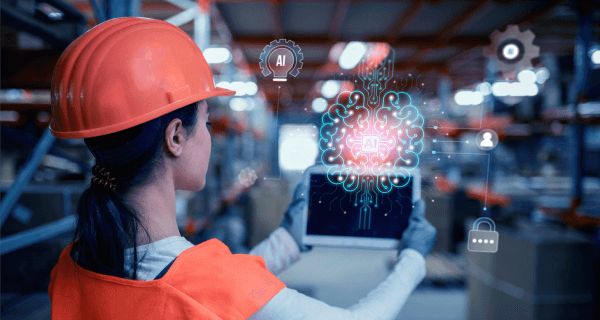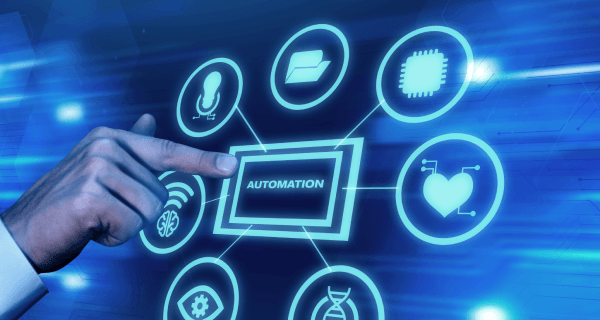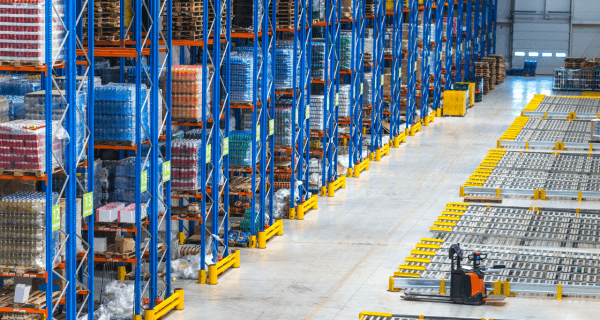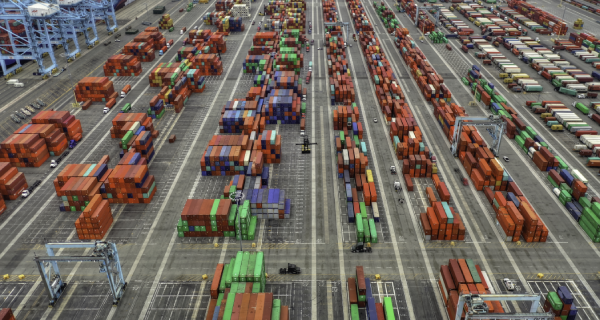The environment of modern supply chain management is in an unprecedented state of flux. Many people are struggling to grasp the full scope of Industrial 4.0, which is pushing limits with cutting-edge technologies. The undulating waves of digital transition elicit both excitement and dread. But don’t be alarmed. This article tries to unravel the enigma that is Industry 4.0, demonstrating the tremendous consequences it has for the supply chain. Dive in, and let’s trace the path to expertise together.
Understanding Industrial 4.0

At its essence, Industrial 4.0 represents the current trend of automation and data exchange in manufacturing technologies. This new era brings about a digital transformation that fuses the physical and digital worlds. The following components are the driving forces behind this revolution:
Internet of Things (IoT)
This technology allows devices to communicate with each other by collecting and exchanging data. IoT devices can assist monitor and manage inventory, transportation, and even equipment health in real time.
Cyber-physical systems
These are integrations in which computer-based algorithms work with physical processes. These solutions offer smoother, more efficient operations in the supply chain by enabling equipment to adapt and respond to changing situations autonomously.
Cloud computing
With cloud computing, unparalleled flexibility is now provided as information from the modern supply chain is stored, processed, and accessed from anywhere, not being confined to a single physical location.
Cognitive computing
This technology is intended to simulate human thought processes in a computational model. It entails increased forecasting, data analysis, and decision-making capabilities for the supply chain.
Key Benefits for Modern Supply Chain

With the advent of Industry 4.0, incorporating advanced technologies and digital transformation, the supply chain stands poised to experience significant improvements and unparalleled growth opportunities. The modern supply chain stands to gain immensely:
- Improved productivity
With the integration of these technologies, tasks that once took hours can now be accomplished in mere minutes. This uptick in efficiency translates to increased output with fewer resources.
- Real-time decision-making capabilities
Through constant data streaming and analysis, decision-makers are now equipped to make informed choices on-the-fly, drastically reducing response times.
- Enhanced flexibility in manufacturing processes
No longer are manufacturing processes rigid. With the power of Industrial 4.0, manufacturers can swiftly adapt to changes, be it in demand, design, or delivery requirements.
- Personalized customer experience
The supply chain is not just about moving products; it’s about enhancing user experience. With insights drawn from data analytics, businesses can now offer tailored experiences, products, and services to their customers.
The Deep Dive: Implications for Modern Supply Chain Management

As the ripples of Industrial 4.0 spread across various industries, its profound implications for the modern supply chain become increasingly evident. The seamless integration of digital and physical systems is not only reshaping manufacturing but also redefining how the entire supply chain operates.
- Risk Management and Predictive Maintenance
Modern supply chain operations now harness big data tools, converting raw data into actionable strategies.
- Data-Driven Decision Making
Predictive analytics offers businesses a clearer crystal ball to gauge market trends.
- Supply Chain Transparency and Visibility
IoT-enabled real-time tracking and feedback mechanisms ensure a smooth sailing supply chain.
- Adaptive and Flexible Production
Adapting to changing consumer preferences is no longer a luxury but a necessity in the modern supply chain.
- Redefining Supplier and Customer Relationships
Digital platforms foster stronger supplier and business relations.
- Sustainability and Eco-Friendly Operations
Efficient design and resource optimization ensure reduced wastage, making the modern supply chain greener.
Challenges Modern Supply Chain: Navigating the Digital Transition

The modern supply chain, bolstered by the innovative solutions of Industrial 4.0, undeniably holds the promise of a brighter, more efficient future. Yet, the path to this golden horizon isn’t without its share of obstacles. To fully understand and appreciate the potential of this transformative journey, one must also recognize the challenges that lie ahead.
- Data Security and Privacy Concerns
Protecting the treasure trove of data from breaches is a significant concern in the modern supply chain.
- Overcoming Resistance to Change
Change is difficult, especially when it comes to overhauling established processes and systems. Employees and management alike may resist a move to a digital-first approach.
- Re-skilling and Training of the Workforce
As automation rises, the need for re-skilling the workforce and promoting continuous learning becomes paramount.
- Investment in New Technologies
Integrating new technologies requires capital. Ensuring they provide sufficient ROI is a gamble many businesses grapple with.
Preparing for Tomorrow Modern Supply Chain Management: Adapting to Industry 4.0

The modern supply chain stands at the crossroads of transformation, with Industrial 4.0 casting a spotlight on the path forward. As the world hurtles towards this new era, it’s not enough to merely understand the changes—businesses must actively prepare. But how can they equip themselves for this brave new world, ensuring they don’t just survive but thrive?
Steps to Adopt an Industry 4.0 Mindset
The modern supply chain needs to transition from traditional to digital practices.
Necessity of Continuous Learning and Adaptability
Investing in training ensures the workforce stays abreast of technological advancements.
Collaboration with Tech Partners and Industry Leaders
Partnering with tech giants offers businesses access to cutting-edge solutions and insights.
In conclusion, as the shadows of Industry 4.0 loom large, businesses across the globe must adapt and evolve. The modern supply chain, powered by these innovations, promises not just efficiencies but a revolution that will change the way we conduct business. Prepare, for the future is now.
In sum, the supply chain’s march into the future is filled with promise and potential. Setting the stage for a robust industrial supply chain begins with choosing the ideal location for your business. Suryacipta presents the ideal backdrop for visionary manufacturing endeavors. The Subang Smartpolitan in Subang, this industrial park is designed with Industry 4.0 in mind. Seamless integration into the global supply chain is ensured through excellent transport connectivity, cutting-edge technology, and state-of-the-art facilities.. Make the move to Suryacipta and drive your business forward in an environment built for tomorrow’s industry leaders.

